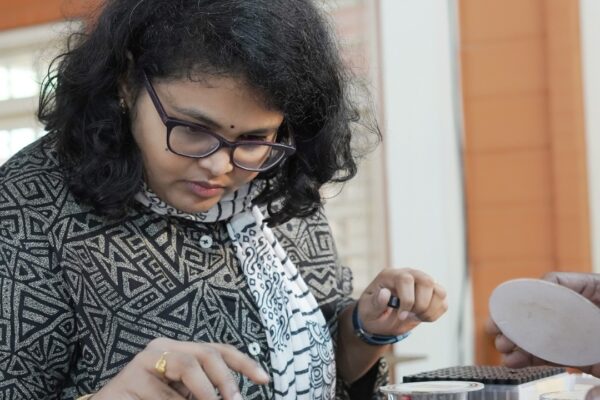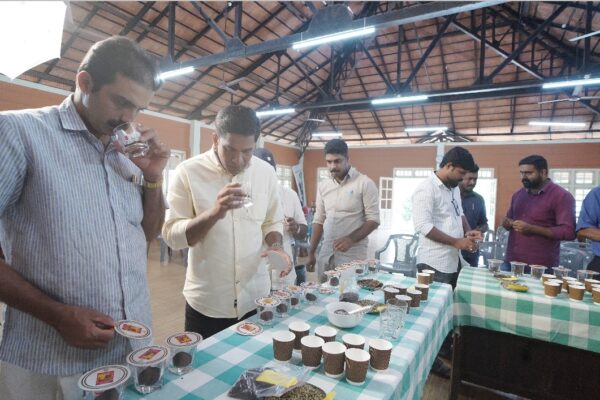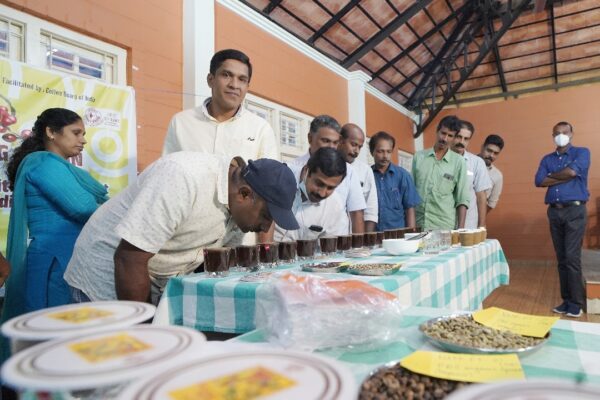Coffee cupping is an essential evaluation method employed by the coffee industry to access the scent, taste, and overall excellence of coffee beans. A significant advantage of cupping is its capacity to facilitate precise flavour analysis. Experts can perceive and articulate the nuanced flavours and aromas present in various coffees that foster effective communication of coffee profiling among producers, roasters, and consumers. This process aids in the accurate classification and description of coffee which promotes ongoing enhancement within the coffee industry and contributes to the progression of the field. Given its importance, Fairtrade NAPP organized coffee cupping sessions under the Fairtrade Coffee Development Plan co-financed by Max Havelaar Switzerland for 4 producer organisations from the Idduki district, Kerala. The event was facilitated by the Coffee Board of India and participated by 30 producer members.
During the cupping session, the Coffee Board scientists carried out an assessment to educate farmers about the importance of coffee cupping scores as a reflection of coffee quality. These scores play a crucial role in establishing coffee prices. The cupping process entails evaluating multiple characteristics such as acidity, body, sweetness, and aftertaste that determine whether the beans meet the desired standards for quality control.

The Coffee Board scientists collected coffee samples from the farmers, which were subsequently hulled, roasted, ground, and subjected to cupping in the Coffee Board Laboratory. During this process, the farmers had the opportunity to evaluate their own coffee samples based on various parameters such as aroma, flavour, and acidity, among others. It provided a comprehensive experience for understanding the assessment of coffee quality using these diverse parameters. The cupping report contained valuable feedback and insights for the producers. Moreover, counter samples were conducted during the cupping session to demonstrate important coffee quality parameters to the farmers. The official emphasized the significance of adhering to good agricultural practices throughout the harvest and post-harvest handling and processing stages.
The event served as a platform for the Fairtrade producers to understand the importance of producing high-quality beans and the impact that defective beans can have on coffee quality. The knowledge and insights gained by the members through the cupping seasons will aid them in the production of good-quality coffee beans.
Testimonials:
“The trainers were highly knowledgeable and passionate about coffee. They had extensive experience in the industry, and their expertise was evident throughout the program. They were able to answer all our questions with confidence and provided valuable insights. The coffee training program I attended was exceptional in terms of the expertise of the trainers, the comprehensive curriculum, the hands-on practice, the tasting sessions, the networking opportunities, the provided resources, and the supportive learning environment. I highly recommend this program to anyone looking to deepen their knowledge and skills in the world of coffee” – Jins Jose
“Smelling sessions and tasting sessions where we sampled various coffee beans and learned to identify different flavour profiles. These sessions helped develop our sensory skills It was fascinating to explore the nuances and complexities of different coffees from around the Idukki district.” – Albin Shaji








